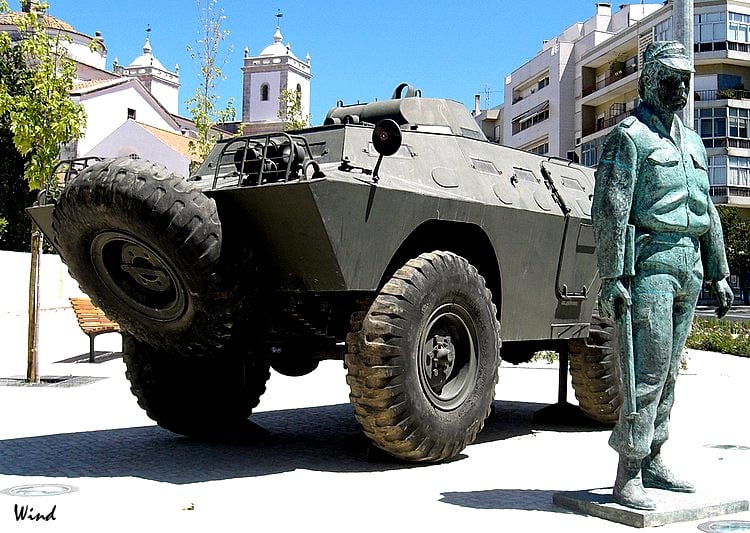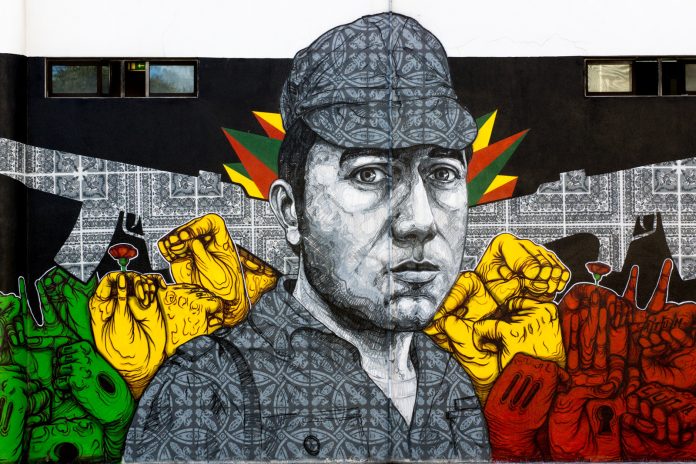Who was Salgueiro Maia?
Fernando José Salgueiro Maia was a Portuguese military man who is considered one of the symbols of the Carnation Revolution. He led one of the revolutionary forces during the Revolution that ended the Estado Novo dictatorial regime in the country. Let’s take a look at the life of Salgueiro Maia, his role in the Carnation Revolution, and the aftermath of the 25 of April in Portugal.
Life of Salgueiro Maia
Fernando was born on 1 July 1994 to a modest family in Castelo de Vide, a small town in the district of Portalegre in Alentejo. His father Francisco da Luz Maia was a rail worker and his mother Francisca Silvéria Salgueiro would die when he was only 4. He lived most of his life in Coruche and Tomar. He only moved away when he was 16 to Pombal.
In 1964, he started at the Military Academy, being placed in the Cavalry Practical School (EPC) in Santarém. There, he rose the ranks to instruction commander and was sent to the North of Mozambique to fight in the Colonial War, joining a commando company. Two years later he would get promoted to Captain and, in 1971, was sent to Guinea.
In 1973, he would return to Portugal and be placed once again in the EPC. This is when the Armed Forces Movement (MFA), the movement that would start the revolution, started having meetings and the Captain would integrate the Coordinating Committee of the Movement.
After the revolution and the end of the Estado Novo, Salgueiro Maia studied Social and Political Sciences, in Lisbon, getting a bachelor’s degree, and adopted two children.
At the end of the 1980s, Salgueiro Maia found out he had cancer and was subjected to surgery in 1991. However, he ended up dying of cancer on 4 April 1992, at the age of 47.
Salgueiro Maia’s Role in the Carnation Revolution
After a failed coup attempt on March 16, the soldiers decided to try again on April 25, the date that would one day be known as the Carnation Revolution.
When it came the time to announce to EPC recruits that a revolution was about to happen with their help, which Salgueiro Maia himself trained, he said in his famous speech:
“Gentlemen, as you all know, there are many types of states: capitalist states, socialist states, and the state we’ve come to. Well, on this solemn night, we are going to end this state! So, anyone who wants to come with me, we go to Lisbon and we finish it. The volunteers can go out and get ready. Who doesn’t want to leave, stays here!”
All the 240 men immediately put themselves ready in front of him. They would march to Lisbon and overthrow the dictatorship.
Maia led the armored vehicles that would lay siege to the Ministries in the Terreiro do Paço. The regime tried to mobilize forces against the revolutionaries, but Fernando Salgueiro Maia persuaded them to join their side. Then, his regiment was about to be bombarded by a pro-regime ship, but this was stopped by a mutiny onboard.
Salgueiro Maia would then also surround the Carmo barracks, where the President of the Council (similar to a Prime Minister) and current dictator of Portugal Marcello Caetano fled to. He negotiated with Caetano and arranged for the President to surrender to General Spínola. Salgueiro Maia also escorted Caetano to the plane that would take him to exile.
Salgueiro Maia became the face of Portugal’s peaceful revolution.
Salgueiro Maia After the Carnation Revolution
On 25 November 1975, the day of the attempted coup by the “radicals” in the MFA, Salgueiro Maia would join the “moderate” forces and lead a group of cars on the orders of the President of the Republic.
After this, he was transferred to the Azores and then returned to Santarém in 1979, where he would command the Santarém Military Prison. In 1984, he returned to the EPC. Finally, Maia was promoted to Major, in 1981, and then to Lieutenant-colonel.

Many other offers were given to the Captain, but he would refuse them all, as he did not want any position of political power after the revolution. This is one of the reasons why he still is remembered, for his selfless acts to free his country.
He refused to be a member of the Council of the Revolution (still during the Revolutionary Period), a military attaché in an embassy of his choice, civil governor of the Santarém District, and to belong to the Military House of the President of the Republic, simply deciding to follow his military career.
Every year, on the 25 of April, his courage and determination are remembered by everyone, with documentaries and speeches about him such as the famous movie Capitães de Abril.
Awards & Recognition of Salgueiro Maia
In 1983, Salgueiro Maia received the Grand Cross of the Order of Liberty, the only award he got while alive. In 1992, he was awarded the rank of Grand Officer of the Military Order of the Tower and of the Sword, of Valor, Loyalty, and Merit. Maia was also awarded the Gold Medal of Santarem in 2007 and on 25 April 2016, the Grand Cross of the Order of Prince Henry the Navigator. This last award was delivered to his widow on the 30 June 2016, the day before his 72nd birthday.


